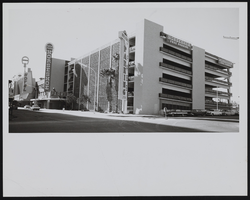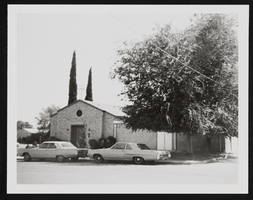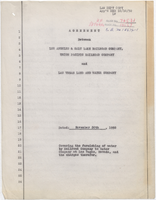Search the Special Collections and Archives Portal
Search Results

Photograph of the parking garage of the casino, Las Vegas (Nev.), December 5, 1962
Date
Archival Collection
Description
Binion's Horseshoe parking garage - Dec. 5, 1962. Stamp on back of photo: "Las Vegas News Bureau Las Vegas, Nevada Convention Center".
Image

Front view of St John's Greek Orthodox Church: photographic print
Date
Archival Collection
Description
Image

Dr. Deborah Kuhls oral history interview: transcript
Date
Archival Collection
Description
Oral history interview with Dr. Deborah Kuhls conducted by Barbara Tabach on December 29, 2017 for the Remembering 1 October Oral History Project. In this interview, doctor Deborah A. Kuhls describes the preparation and procedures implemented at the University Medical Center of Southern Nevada (UMC) during the night of the October 1, 2017 mass shooting in Las Vegas, Nevada. She describes her experiences from that night and into the next morning, starting from when the trauma center first learned about the shooting to when patients began arriving. She goes into detail on the hospital's Military-Civilian Trauma System Partnership, which allowed for the installation of a second trauma area to treat the large volume of patients. In addition to the events at the hospital, Kuhls talks about the flurry of activities during the week of the shooting, including interviews with various media, the statewide meeting for surgeons, fellows, and residents where "stop the bleed" training was provided, and general meetings with various government officials, including Donald Trump. Deborah Kuhls also discusses the emotional impact of the shooting and its aftermath as well as her goals for the future of trauma in the medical field.
Text

Transcript of interview with Arte Nathan by Claytee White, December 11, 2014
Date
Archival Collection
Description
Text

Agreement regarding the furnishing of water from Los Angeles & Salt Lake Railroad Company and Union Pacific Railroad Company to the Las Vegas Land and Water Company, November 30, 1950
Date
Archival Collection
Description
Contract between the Las Vegas Land and Water Company and the railroad and the new rate the water company will pay for water. "C.D. No. 15674-1" written in ink on cover page. Also has stamps "U.P. Audit No. 74531" and "LVL&WCo Audit No. 10567." Law dept. copy, approved by E.E. Bennett October 10, 1950.
Text

Meeting minutes for Consolidated Student Senate, University of Nevada, Las Vegas, March 20, 1975
Date
Archival Collection
Description
Text

Yeon-Kyung (Mar) Chung oral history interview: transcript
Date
Archival Collection
Description
Oral history interview with Yeon-Kyung (Mar) Chung conducted by Emilee Caivin on November 10, 2021 for Reflections: The Las Vegas Asian American and Pacific Islander Oral History Project. In this interview, Yeon-Kyung (Mar) Chung talks about her upbringing in Korea and her educational history, studying Spanish abroad in Spain and Italy before earning her graduate degree in Latin American Studies from the University of Texas, Austin. Mar Chung talks about her move to Las Vegas, Nevada in 1999 to enroll at the College of Southern Nevada and the University of Nevada, Las Vegas to pursue pharmaceutical studies like her parents. She talks about her experience as a single mother, her path to citizenship in the United States, and the Las Vegas Asian American community. Mar Chung also reflects on differences between how she was raised compared to the upbringing of her two children.
Text

Irving Junior Foreman interview, March 16, 1978: transcript
Date
Archival Collection
Description
From the Ralph Roske Oral History Project on Early Las Vegas collection OH-00600. On March 16, 1978, collector John Russell Foreman interviewed Irving Junior Foreman (born June 25th, 1930 in Beaver, Utah) in North Las Vegas, Nevada. In this interview, Foreman speaks about his career in the construction industry in Las Vegas, Nevada. He also discusses the changes in the construction industry from the 1950s to the 1970s, including the machinery used.
Text
Skaggs, Robert L.
Dr. Robert Skaggs was born April 2, 1932 and grew up around the St. Louis, Missouri area. His father was a teamster with a milk delivery route, tried his hand at the restaurant business, and during World War II worked for the United States Cartridge. Several members of Skaggs’s family were teachers, including his grandmother and a couple of aunts. Skaggs graduated from Normandy High School and afterwards attended the Missouri School of Mines and majored in metallurgical engineering. He graduated in 1954 and went to work for DuPont University for two years.
Person

